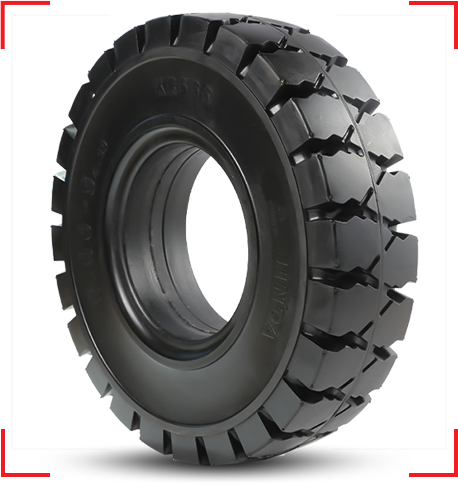Unlike pneumatic tires that are filled with air or cushion tires with a rubber and air composite, solid forklift tires are entirely made of solid rubber or polyurethane compounds. This solid construction renders them immune to flats, punctures, and blowouts, providing an advantage in heavy-duty operations and rugged terrains commonly encountered in warehouses, distribution centers, and manufacturing facilities.
The durability of solid forklift tires significantly reduces downtime caused by tire maintenance and replacements. The absence of air eliminates the need for tire pressure monitoring and the risk of punctures, ensuring continuous operation and reducing the costs associated with tire repairs or replacements.
the solid structure of these tires offers enhanced stability and load-bearing capacity. The sturdiness and consistent contact surface of solid tires contribute to better weight distribution, improved traction, and increased load-carrying capability, allowing forklifts to handle heavier loads efficiently and safely.
Solid forklift tires are known for their resistance to wear and tear, making them suitable for high-intensity usage. They excel in harsh operating conditions, such as construction sites or recycling facilities, where debris, sharp objects, or uneven surfaces might pose a threat to conventional tires.
these tires require minimal maintenance compared to pneumatic or cushion tires. With no air pressure to monitor or frequent replacements due to punctures or wear, solid forklift tires offer a lower total cost of ownership and reduced operational downtime, contributing to increased productivity in material handling operations.
While solid forklift tires offer numerous advantages, they do have some limitations. Their solid construction can result in a rougher ride compared to pneumatic tires, potentially affecting operator comfort and contributing to increased vibration. However, advancements in tire design and materials aim to mitigate these concerns, improving the overall ride quality.
innovations in solid tire technology have led to the development of specialized compounds and tread patterns that enhance traction, reduce rolling resistance, and improve overall performance. These advancements address some of the traditional limitations of solid tires, making them more adaptable to various operating conditions and increasing their suitability for a broader range of applications.
solid forklift tires stand as a reliable choice in material handling operations, offering durability, puncture resistance, and reduced maintenance requirements. Despite some inherent limitations, ongoing advancements in solid tire technology continue to improve their performance, making them an increasingly popular choice for industrial settings seeking reliable and efficient tire solutions for their forklifts and material handling equipment.




 Français
Français
 عربى
عربى
 Español
Español














